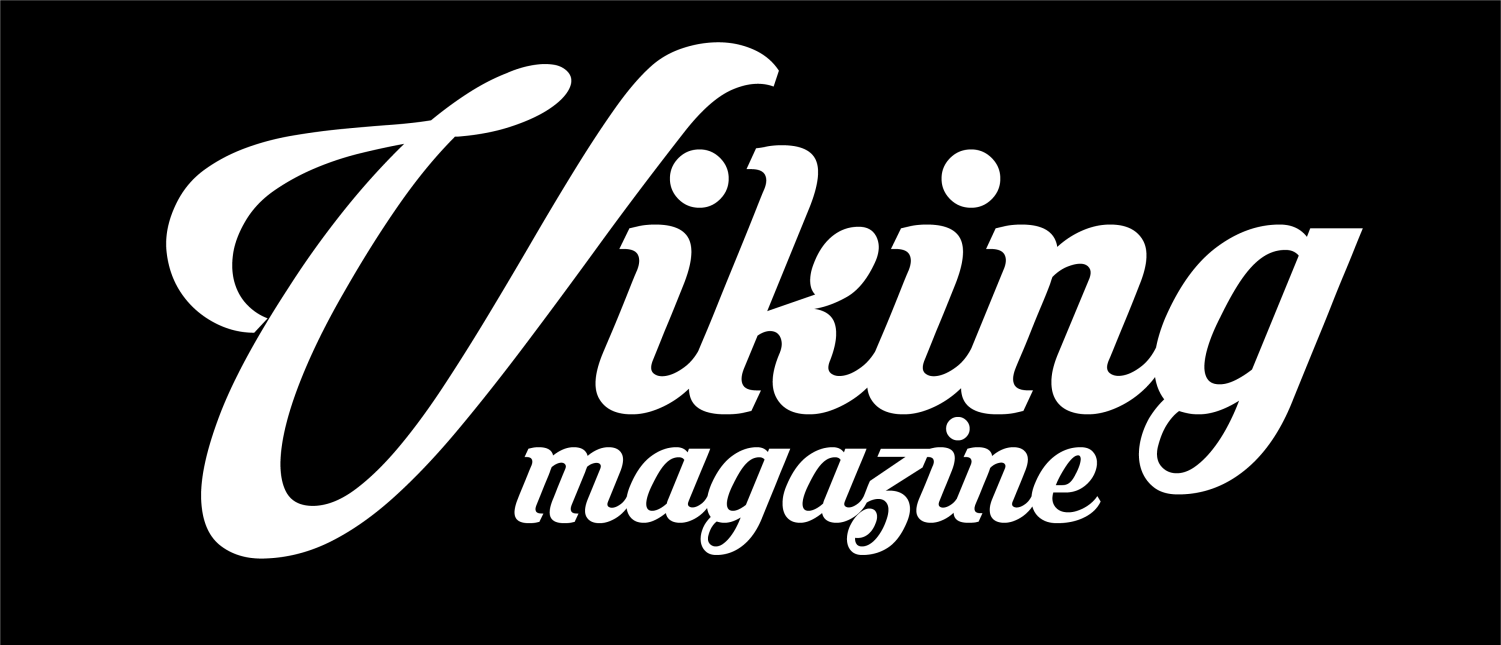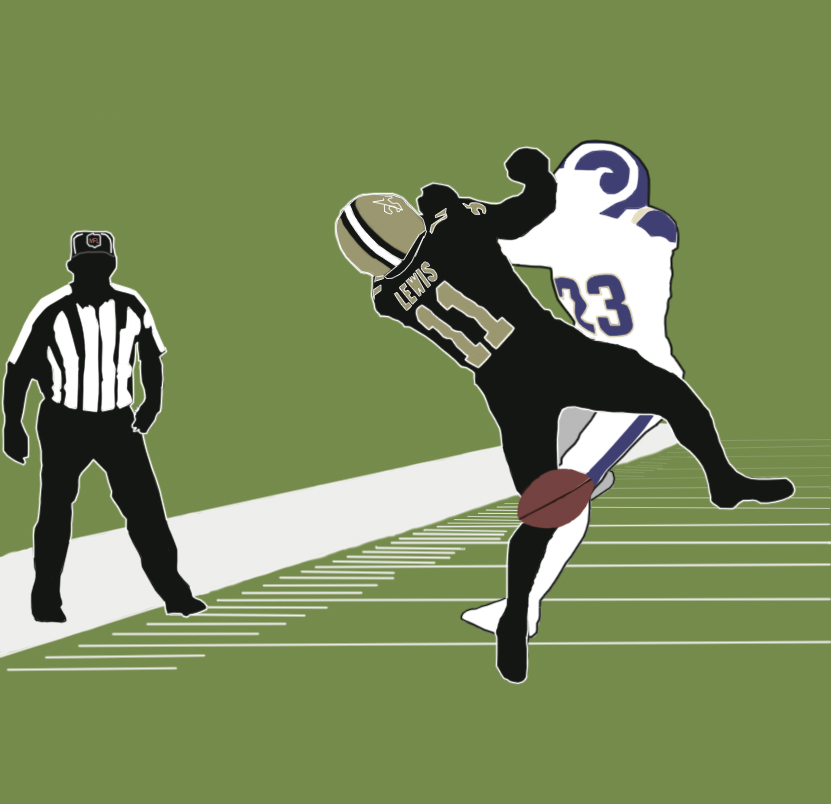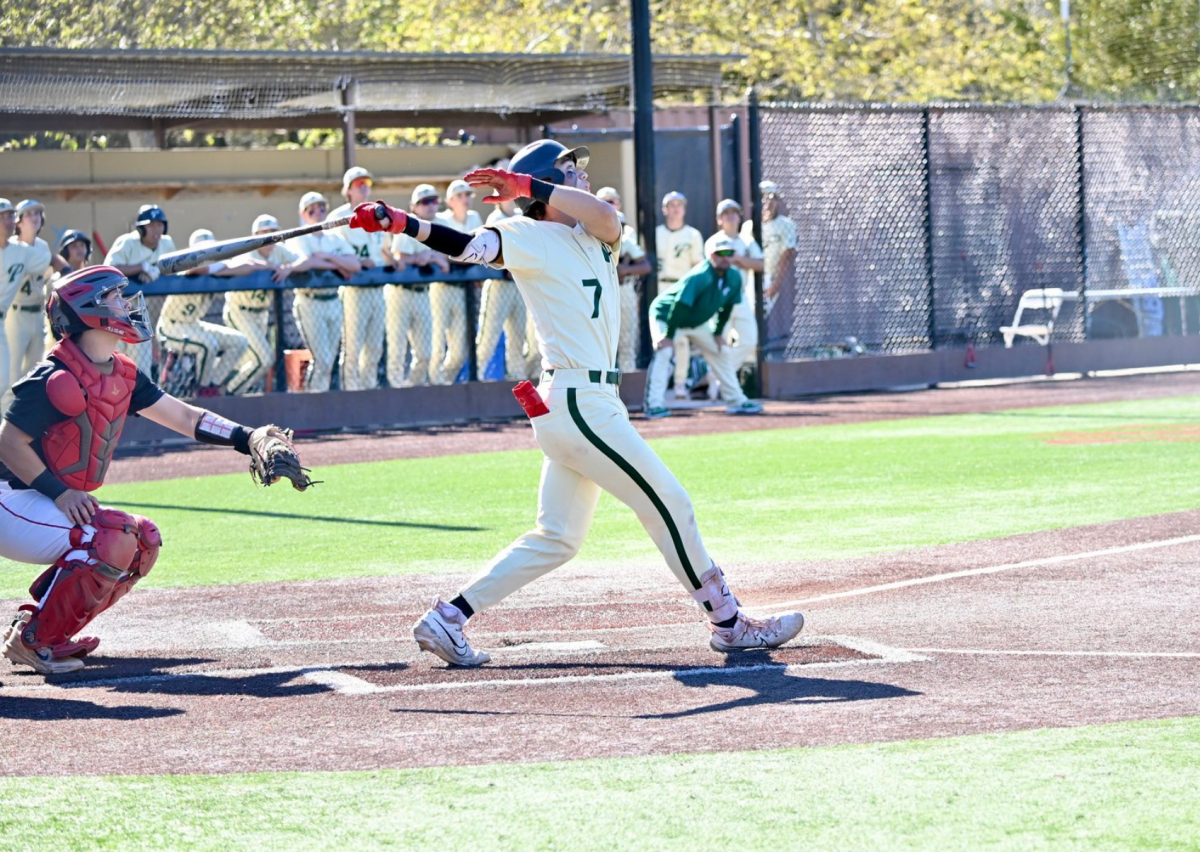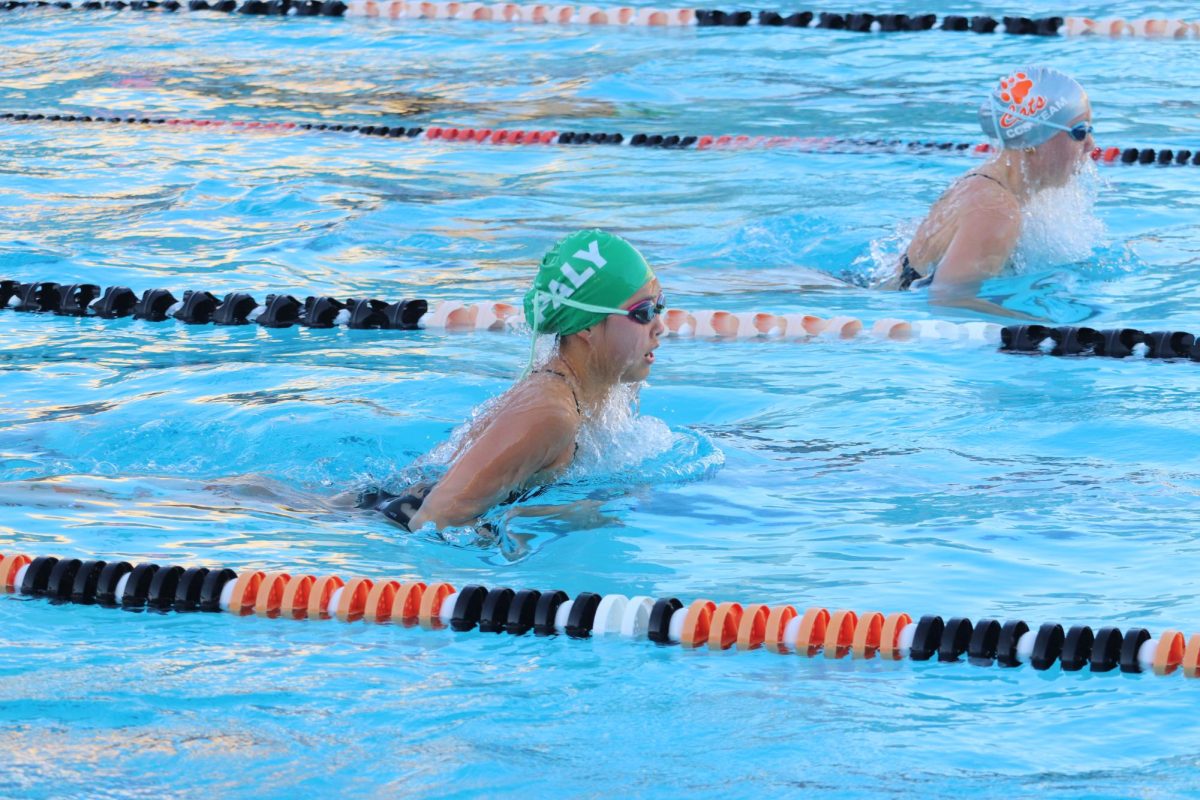Judges of the Game
Referee’s are responsible for enforcing the rules of a certain sport, thus legitimizing them in the eyes of the fans. But the toxic environment created by difficult calls has encouraged sports legues to change the way referees operate.
April 10, 2020
Saints receiver Tommy Lee Lewis streaks down the right sideline to catch the pass that Drew Brees lofts him. Before he attempts to secure the football, he’s hit to the ground by Rams cornerback Nickell Robey-Coleman. Saints fans jump out of their seats, frustrated about the missed opportunity to advance further downfield. But that frustration quickly turns to anger, and that anger is directed exclusively at one group: the referees, and the glaring absence of their penalty flags on the field.
Pass-interference is defined by the NFL as “[any player] significantly hindering an eligible player’s opportunity to catch the ball.” Surely a helmet-to-helmet hit to a receiver while the ball was still in the air meets this criteria. But the game went on without pause, and despite the Saints’ lead after the subsequent field goal, the Rams managed to force overtime and ultimately win the 2019 NFC championship.
This single missed call (which was indeed a mistake, as confirmed by the NFL after the game and even by the cornerback delivering the hit himself) became one of the most significant scandals concerning an officiating error in sports history. This scandal was so egregious that a Saints fan filed a lawsuit against the NFL, alleging that the team was deprived of an opportunity at the Super Bowl.
In the big picture, considering that officials typically receive scorn for their mistakes and seldom praise for making tough calls in real-time, some of the criticism received for this play may have been a bit overblown (we’re looking at you, Saints fans—enough with the death threats). But the truth is that this blown call changed the outcome of the 2019 NFL season, and hence much of this backlash was justified.
In response, the NFL has started to change the way games are officiated. This includes relying more on instant video review and so-called “sky judges,” which are top expert officials who can weigh in on a situation remotely.
If a ruling on the field is challenged or the officiating crew thinks it’s made an error, they consult with rules experts and replay officials at the Art McNally Gameday Central building in New York. The play is then looked at from various broadcast angles on any of the 82 high definition TVs to ensure the correct call.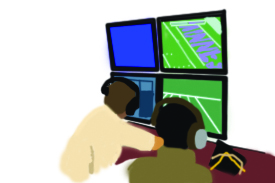
Other professional sports leagues, such as the NBA, have also implemented similar systems. Their backseat-refs are located in a state of the art facility in Secaucus, New Jersey. The willingness of the leagues to create these centers conveys to the public an important message: they want to get the call right. But increasing accuracy and precision have also had effects on the role that on-the-field officials have.
In the days before replay review, it was widely understood that bad calls happened more frequently, and there was nothing anyone could do to change it. In this sense, referees were given immense control over the outcome of the game. Corruption existed as a result, most notably with referee Tim Donaghy in the late 1990s. His ability to bet on and fix games was not hindered by challenges or reviews, and he was able to wager tens of thousands of dollars on games he could dictate the outcome of. He would eventually be investigated by the FBI and serve 15 months in a federal prison camp in Florida.
Donaghy’s legacy is one that the NBA would like to soon forget. The implementation of the replay review system was one step towards doing so. By allowing officials in a replay center to change calls based on video evidence, the on-the-court referee loses the ability to “play god.”
Yet this amount of power is still held by high school officials. They have complete power to dictate the outcome of the game, and it is difficult to appeal their rulings to a higher up. Scott Calvin, a director of the High School Referees Association, directs referee training and evaluates their performance on the court. He is responsible for the training and assignment of over 150 referees in Santa Clara County, yet he still works some games himself.
“We’re here to enforce the rules as written in the book,” said Calvin. “We try to encourage players and captains to be leaders on the court.”
At one of his games, the typical high school players’ hostility towards refs spun out of control, ultimately jeopardizing his safety.
This game came down to the wire, and one team won on a buzzer-beater. Naturally, many fans on the losing side of the matchup were unhappy with the result: who better to take that anger out on than the person calling the game?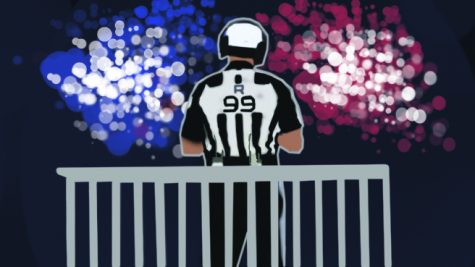
Calvin, unaware that he was about to be tailed, left the gymnasium as usual and got in his car to go home. That was when he noticed what some of the players were up to.
“I was followed out in the parking lot by a group of students,” Calvin said. “They got in a car and followed me with fake police lights and sirens. They followed me about a mile down the road and then turned off and went another way.”
Arguing with a referee is one thing — impersonating a police officer is another. Many people would probably quit their job, or at the very least take time off if someone threatened their safety for doing their job, but Calvin didn’t.
Most fan and player interactions with referees don’t turn out this way, but there is always the possibility that they will. This is in large part due to the ignorance that is so prevalent among players about the intentions of referees. Sebastian Chancellor, a sophomore shooting guard for the JV basketball team, respects referees and their ability to dictate the result of contests.
“One foul can change an entire game,” Chancellor said. “It’s crazy how much that effect comes into play in such big moments.”
To curb this, sports leagues have experimented with making refereeing completely objective. For instance, Major League Baseball has experimented with robot officials, which have a camera fixed on the strike zone and relay the call to an on the field umpire. In the future, this could result in human umpires becoming obsolete, in favor of machines who will never make mistakes. This is a somewhat frightening thought, but one that could easily become a reality should the MLB choose to pursue it.
The one parallel throughout the three aforementioned sports leagues is that referees’ roles on the field have changed. They have lost credibility among coaches and players, in large part because most of the calls they make can be appealed to a higher power. This has resulted in a shocking change in attitude towards referees calls.
Since team members are aware that the on-court refs don’t have the sole power to dictate the game, they are more likely to be disrespectful or argue calls. Anyone who has watched the NBA has seen this trend — star players like Russell Westbrook and Kevin Durant regularly argue subjective calls like personal fouls. Increased power to the players has led to poor character and sportsmanship.
The attitudes of these star players are often emulated by players in youth and teen sports. Athletes regularly copy the actions of their favorite players, in hopes of becoming more like them. For instance, Stephen Lee, a junior outfielder for the varsity baseball team uses Nolan Arenado’s in-game actions in his gameplay.
“In practice, I use drills that [Arenado] does,” said Lee. “He does it in games, but I use it as a drill to help me stay back and create more force into my front leg.”
This intentional emulation is often accompanied by unintentional copying of behavior. While Lee might have focused on recreating Arenado’s performance, it was impossible to miss him charging the mound at Padres pitcher Luis Perdomo, in an attempt to land a few punches. Since young players subconsciously copy their favorite players’ poor attitudes towards refs, what results is a worse-off community of youth and professional sports. Players beg to refs: “Don’t pick sides — unless it’s my side.”
This attitude has been argued against profusely by many in the basketball community. Most notably, two-time NBA champion Mychal Thompson said that Lebron “complains too much on the court” in an interview with ESPN. Whatever the reaction, stars still argue and complain, and it works. Lebron James averages a minuscule 1.8 fouls per game, while still averaging 34.9 minutes.
Despite this mentality being completely backward when applied to high school sports, players still stick to it stubbornly. They seem to not understand that there is no replay review system for high school sports. They can’t file a lawsuit or appeal to a rules expert mid-game. Many referees are just there to give back to a game they love, yet players treat them as if they should never make a mistake.
The truth is, referees are just trying their best in any given situation. Calling a difficult play while parents, players, and coaches are all yelling in your ear is difficult enough without having to endure constant backlash. Referees by and large do their jobs simply because they love the game.
To avoid the constant back and forth between players and referees, some sports leagues have done away with them entirely. Take USA Ultimate, the governing body of ultimate frisbee in the USA; in most ultimate frisbee games, players call fouls themselves with officials being present only at the highest level of play.
[Spirit of the Game] refers to the spirit of sportsmanship that places the responsibility for fair play on the player.
— USA Ultimate Rulebook
According to the USA Ultimate rulebook, “The integrity of Ultimate depends on each player’s responsibility to uphold the Spirit of the Game.” Spirit of the Game refers to “the spirit of sportsmanship that places the responsibility for fair play on the player. Highly competitive play is encouraged, but never at the expense of mutual respect among competitors, adherence to the agreed-upon rules, or the basic joy of play.”
In other words, without referees, players are expected to hold themselves to a high standard of sportsmanship and not take advantage of this honor system.
This strategy has its weaknesses. For one, when a sport gets to a certain level of competitiveness (usually with a lot of money involved), implementing a “Spirit of the Game” approach will most likely be ineffective in keeping players and fans satisfied. With enough money or glory on the line, players may do whatever it takes to win, including calling a questionable foul on an opposing player.
For this reason, the AUDL (American Ultimate Disc League) does indeed have officials. But the majority of people playing ultimate are still at the amateur or collegiate level: games are self-officiated.
The lack of refs definitely delegitimizes the sport in many people’s eyes, who think frisbee is just something to play with dogs
— Evan Kandell
Paly senior Evan Kandell is a member of the highly decorated locally-based Gunn Control ultimate team, which won three consecutive state championships from 2017 to 2019. Kandell believes that the self-officiated nature of Ultimate is what makes the game so much fun to play.
“In Ultimate, flopping doesn’t exist, since there’s no one to convince besides your opponent,” Kandell said. “Instead, players are a lot more honest about their calls. People are also just nice to each other in Ultimate communities, which I’ve seen much less in other sports.”
Kandell acknowledges that for professional Ultimate to be more accepted in the mainstream, referees are needed.
“The lack of refs definitely delegitimizes the sport in many people’s eyes, who think frisbee is just something to play with dogs,” Kandell said. “They think that anything without refs can’t be a real sport, but I believe that if people were exposed to what Ultimate is actually like, both athletically and in terms of referees, they would change their minds.”
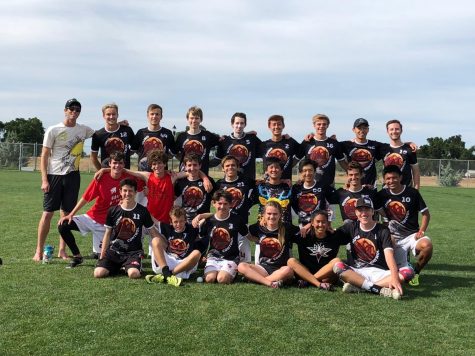
Photo courtesy of Evan Kandell.
Having referees is a double-edged sword. They can create a toxic environment where players, coaches, and fans are yelling obscenities and threatening officials. But at the same time, they are a necessity because they legitimize sports and make sure that they are played fairly.
Referees do come at a cost, but not a large one. The most that a referee can make officiating one CCS match of any sport is $90, which is obtained by being a member of a 4-man crew for a football game. This is not nearly enough to cover the cost of living expenses, which means that referees typically officiate due to their passion for a particular sport, not the monetary gain.
Yet referees’ love for the game is often overshadowed by questionable calls. Players take foul calls to heart and sometimes interpret calls as a reflection of bias towards one team. In their eyes, it is a simple task to call a game correctly and fairly. But they seem to forget that high school referees don’t have the benefit of looking at alternate angles or seeking an opinion from a rules expert. Due to the sensational nature in which the media portrays player-referee interactions in the professional setting, players at the high school and amateur levels tend to emulate their idols.
Freshman Kaella Peters, a point guard on the varsity basketball team at Paly, has had many experiences with calls late in the game-deciding the outcome.
“They make me very emotional, especially when they’re called intentionally, even though other players are grabbing me,” Peters said.
Player-referee interactions are always ridden with tension. They usually transpire in the heat of the moment, when players are flushed with adrenaline and fatigue. Referees are dealing with yelling parents and coaches who are trying to get calls to favor their side, and colleagues who are trying to help them make the correct calls.
The dedication that referees have, despite threats from fans and players, is honorable. They are underpaid and over-criticized, yet they charge on. Calvin’s motivation, like many others, is “the camaraderie with fellow officials and the lifelong friendships that I’ve been able to obtain by working.”
The role of referees is undoubtedly important. No personnel member can legitimize a sports league in the same way that they can, nor are there people who are as heavily criticized and scarcely commended. Throughout the last few decades, their role has dramatically changed in professional sports, which has trickled down to youth sports. The only question left to ask is: how will their role change in the future?
